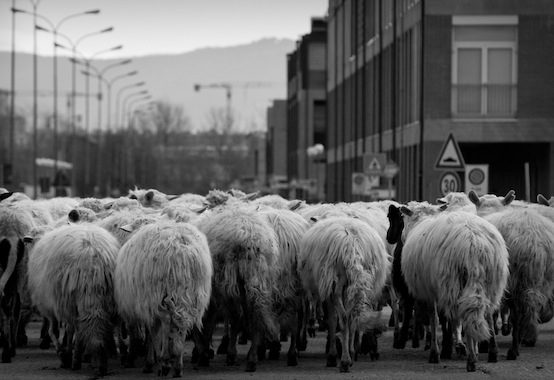Why Being an “Excellent Sheep” Isn’t So Bad

William Deresiewicz’s July article for The New Republic, “Don’t Send Your Kid to the Ivy League,” launched a insightful, heated debate about the nature and meaning of education. In the newest edition of The New Yorker, Nathan Heller has penned a thought-provoking review of Deresiewicz’s newly-released book, Excellent Sheep: The Miseducation of the American Elite and the Way to a Meaningful Life, specifically considering its discussion of self-focus and career, comparing them with the writings and thought of Robert A. Nisbet.
In considering universities’ education, Deresiewicz asks whether they produce self-realization: “The highest function of art, and of literature in particular, is to bring us to that knowledge of ourselves that college ought to start to give us,” he writes. But Heller objects to this:
The groovy lore of college—the notion that it is a place to find yourself, follow your passions, learn to think in ways that benefit the world … Nisbet thought that these ideals were mostly feel-good bunk. Since when was it the university’s responsibility to solve all of society’s problems? he asked. And why should a professor rich in knowledge have to teach things that a callow nineteen-year-old considered “relevant” and “meaningful”? Academe ought to focus on the one thing that it actually did well: letting scholars teach what they knew. That teaching might nurture intellectual skills that the students could use in the real world, but how it did so was mysterious and, anyway, beside the point.
This older idea of knowledge—something inherently and, indeed, objectively good—is contrary to “knowledge” in the conception of Deresiewicz and others, which must be self-applicable in order to be meaningful. But it’s true that Deresiewicz’s call for self-actualization is a bit more complicated than this (Heller notes that Excellent Sheep is “full of such confusions”). In an interview with The Atlantic‘s Lauren Davis, Heller explained the meaning of his book’s title:
… [Students are] sheep, because they have never been given an opportunity to develop their ability to find their own direction. They’re always doing the next thing they’re being told to do. The trouble is that at a certain point, the directives stop. Though maybe not, because even when it comes to choosing a career, there are certain chutes that kids, especially at elite colleges, tend to get funneled towards.
Here, Deresiewicz is denouncing the career-focused structure of learning and the limits it imposes on self-reflection, rather than denouncing the actual subject matter of learning itself. Later on, he applies these thoughts to the classroom and the way students absorb knowledge. “The main point,” he says, “is to know yourself so you know what you want in the world. You can decide, what is the best work for me, what is the best career for me, what are the rewards that I really want.”
These two realms in which Deresiewicz identifies a lack of “self-awareness”—the technical/professional and the personal/intellectual—are connected by the ingredient of time. Students are so busy pursuing parent or university-imposed trajectories that they have no time to reflect on their learning, what it’s for, how they ought to apply it. Deresiewicz has some good points here: it is true that, though knowledge itself is objective, we will be unable to see how it threads its way through our lives unless we cultivate a healthy amount of reflection.
But Heller has good points, too: he acknowledges that education ought not revolve around career paths and money, but also sees the tension between career and academics as the “fragile,” eternal balance of the university. And despite Deresiewicz’s criticisms of students’ frantic schedules, Heller writes that “the truest intellectual training could be how to stay calm, and keep thinking clearly, in the high-strung culture in which students need to make their lives.” These are truly lessons that will remain relevant throughout a person’s life. Heller seems to say that being an “excellent sheep” isn’t so bad, if you are truly an excellent one. Perhaps being a sheep is the first step along a path to eventual intellectual independence and prudence.
Deresiewicz sees the frantic chaos in students’ lives, and argues self-reflection will assuage their depression and give them meaning. Heller sees the chaos, and suggests that this is the way in which gold emerges from dross. It could be that both are right, to an extent: the key is, perhaps, in the “excellent” part of “excellent sheep.” If the core of an education is good and insightful, it will cultivate strong and thoughtful minds. Some students may still run frenzied and stressed between internships and fellowships, papers and projects, exams and speeches. But the meat of what they learn, their daily bread of knowledge, will sustain and grow their self-reflective souls. And eventually, whether during college or after, they will be sheep no more.